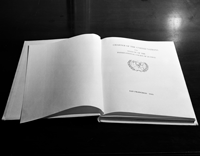Proponents of the responsibility to protect (R2P) doctrine contend that it is necessary to reform the post-1945 United Nations noninterventionist regime in order to come to grips with armed conflicts that take place entirely inside independent countries but that produce grave human rights violations. As it stands, the U.N. regime is fundamentally restrictive, resting on a doctrine of nonintervention as set out in Article 2 of the U.N. Charter. Armed force can lawfully be employed only for two basic purposes: national defense and international peace and security. Those two elements of the U.N. justification of lawfully going to war, known by the Latin term "jus ad bellum," are enshrined in Article 51 and Chapter 7 of the Charter. They undergird and reinforce the U.N. political regime of equal sovereignty, territorial integrity and nonintervention as set out in Article 2.
That noninterventionist regime should be seen in the historical context from which it emerged: the end of World War II. That war was waged by the allies against Nazi Germany and Imperial Japan, whose foremost war crimes were acts of aggression, armed intervention, military occupation and political control of various European and Asian countries. Indeed, the first crime enumerated at Nuremberg was the crime of aggression. Surviving leaders of Nazi Germany were accused of military conquest and the occupation of numerous countries of Western, Northern and Eastern Europe. The Tokyo war crimes tribunal leveled the same charges against leaders of Imperial Japan. That vital historical context provides the backdrop to the U.N. Charter and its central principles of nonintervention and a limited right of war.
The R2P doctrine seeks to reform that U.N. noninterventionist regime by expanding and liberalizing the jus ad bellum to include civil wars and other conflicts internal to countries that produce grave human rights violations but have no damaging international consequences. In the language of the "Report of the International Commission on Intervention and State Sovereignty":

